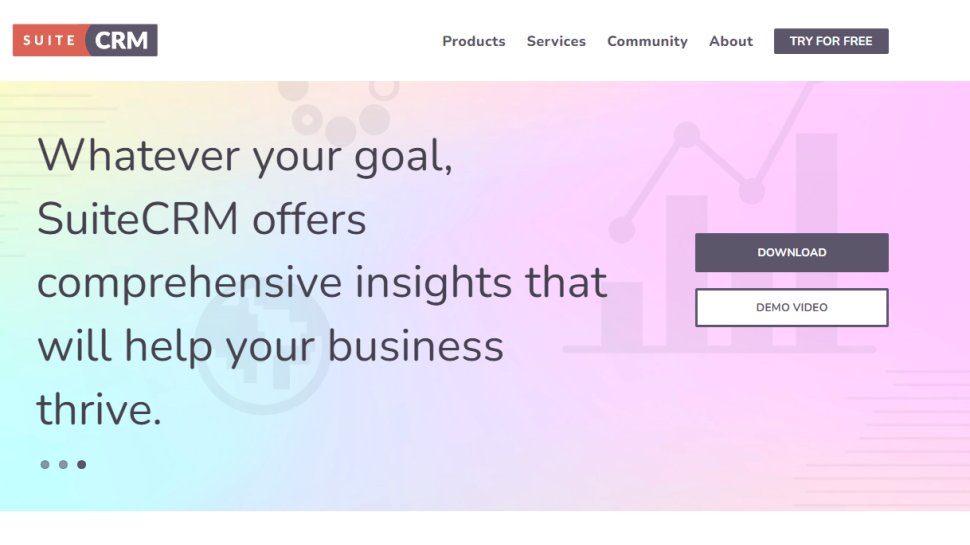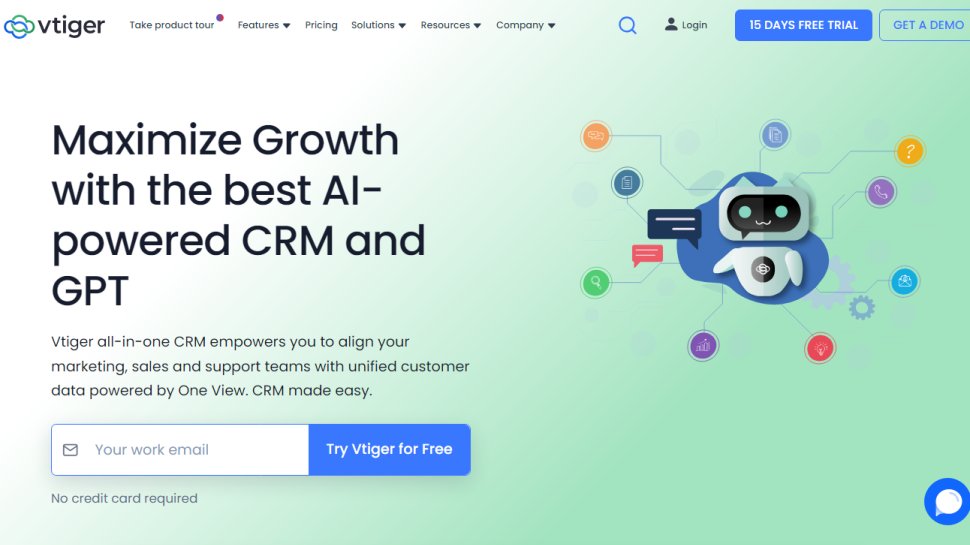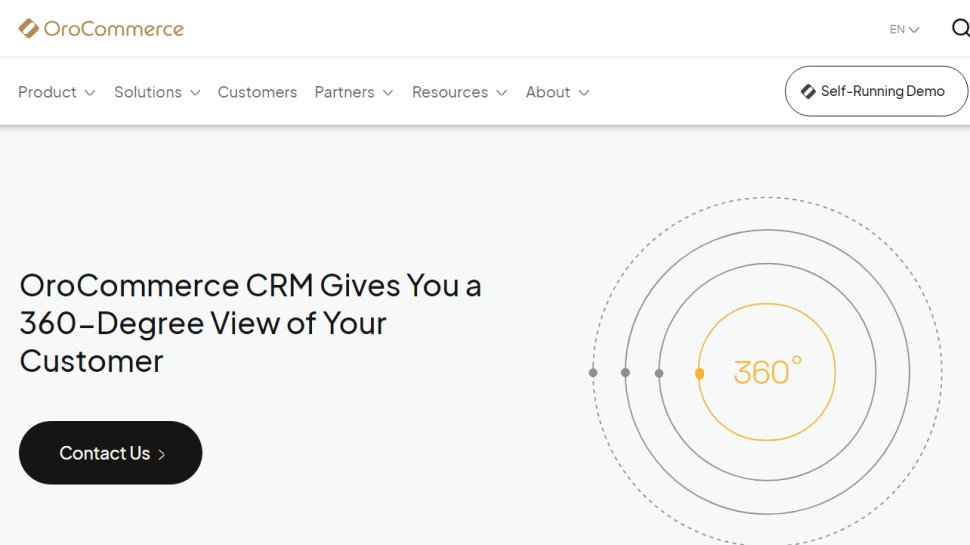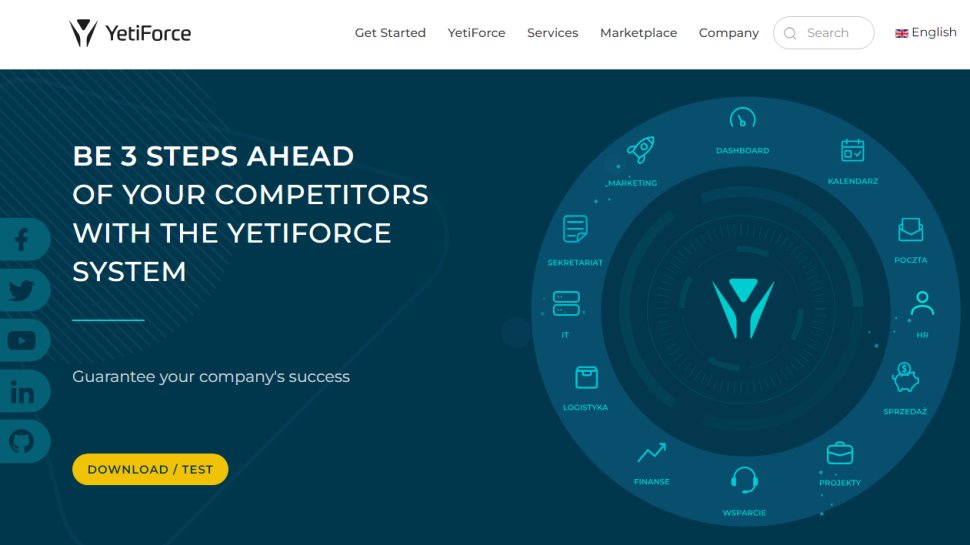Best open source CRM of 2026
The best open source CRM is free, while remaining intuitive

We list the best open source CRM solutions to make it simple and easy to manage your customer relationships, without needing a subscription.
The rise of open source technologies certainly has to be taken into account regarding any discussion of the the best CRM software. Open source technologies are those where the source code has been released for free to the wider community, which means this is also a great list to browse if you are looking for the best free CRM software on the market.
At TechRadar Pro, our experts go beyond the marketing hype to rigorously test the technical foundations of open-source software. We don’t just look at screenshots; we perform hands-on installations, evaluate the ease of deployment on local and cloud servers, and vet the activity of the developer community.
SuiteCRM is our top pick for the best open-source CRM because it offers a level of power and depth typically reserved for expensive enterprise platforms like Salesforce. Built on a modern, decoupled architecture (SuiteCRM 8), it provides total freedom to customize every aspect of your sales, marketing, and service workflows without any per-user licensing fees. However, as you'll see below, there are many other open source CRMs that are worth your consideration.
Reader Offer: 30-day free trial
Salesforce's CRM software helps businesses maximize customer data with features like lead scoring, omnichannel routing (which directs customer inquiries to the right agent across multiple channels), advanced pipeline management, and deal health insights. It's the ideal solution for companies looking to boost customer relationships and optimize sales processes.
Preferred partner (What does this mean?)
The best open source CRM 2026 in full:
Why you can trust TechRadar
Best open source CRM overall
1. SuiteCRM
Reasons to buy
Reasons to avoid
Originally emerging as a fork of SugarCRM’s now-defunct open source version, SuiteCRM has acquired plenty of dedicated followers of its own - and not just those that previously enjoyed using SugarCRM,
In terms of features, SuiteCRM offers all the tools that businesses need for sales, marketing, and more, with a number of customization options allowing businesses to design and create an interface that suits their needs. It’s easy to craft a real-time dashboard so you can follow various metrics, check on project statuses, and access data-based insights.
Aside from the functionality on offer, SuiteCRM has also enjoyed impressive popularity because of how flexible it is. SuiteCRM works on Windows, OS/X, Ubuntu, Android, and iOS operating systems, so it’s likely that you’ll be able to make the most of SuiteCRM regardless of the device you most commonly use.
SuiteCRM’s flexibility is also on show in terms of the wide range of add-ons available, including AI tools, eSign software, and more, so it’s likely that you’ll be able to apply it to your project, regardless of complexity. This is also a hugely intuitive CRM, which is easy to use - another factor in its popularity. Ease of use is also not something that is necessarily associated with open source tools, so the fact that the learning curve is not particularly steep is to be welcomed.
Updates for SuiteCRM are also issued pretty frequently, so there’s less of a need to worry about SuiteCRM becoming out of date. For instance, this year, SuiteCRM has introduced AI-driven dashboards that offer predictive forecasting. By analyzing historical deal data, the CRM can now suggest which leads are most likely to convert, helping small teams focus their energy where it counts. The roadmap for further updates also includes a cleaner, more responsive user interface and an upgraded REST API.
There are some drawbacks, of course - mainly with support and a lack of integrations. But this is still a robust, free, open source tool that is worthwhile for any business that is looking for a new CRM tool and has grown frustrated with the proprietary options on the market.
Best open source CRM for support
2. Vtiger
Reasons to buy
Reasons to avoid
One of the major advantages of using open source software is gaining access to the vibrant and extensive open source community. This is especially noticeable with Vtiger, which has more than 4.5 million downloads on SourceForge, a web service specifically for open source software. As such, Vtiger has a huge number of developers and users who are familiar with the software, many of whom are happy to offer assistance if needed.
In terms of features, Vtiger users will gain access to email marketing functionality, calendar reminders, and automation features. The functionality on offer here will help businesses track leads, shore up customer relationships, and identify new opportunities. The fact that Gmail integration is included is another nice touch, too.
Vtiger has also shown a clear willingness to jump on board the AI revolution. Vtiger now supports local LLM connections, allowing users to use AI to summarize meetings or draft emails without their data ever leaving their own private server - a massive advantage for privacy-focused industries.
Regarding Vtiger’s downsides, the user interface isn’t the most intuitive and larger businesses might find that it isn’t ideal for bigger client numbers or multiple sales pipelines. It’s also worth noting that Vtiger does offer a subscription service as well as an open source one. So, if you broadly enjoy Vtiger’s CRM but don’t feel like you have the in-house resources to tinker with its open source features, this might be a decent option for you.
Best open source CRM for flexibility
3. OroCRM
Reasons to buy
Reasons to avoid
Another open source CRM that is worth your consideration is OroCRM. Based on the Symfony2 PHP framework for web development, OroCRM comes with a range of customer management, reporting, analytics, and other features.
Perhaps most impressively, a number of developers have praised OroCRM for having code that is easy to understand and change. This, after all, is what open source software should be all about - providing new levels of transparency and adaptability that democratize the software landscape. That’s certainly the case with OroCRM.
Other strengths of OroCRM include the ability to record customer credentials and all communication, which is sure to be hugely beneficial for your sales team. The integration of an anti-spyware module also means that businesses can feel a little more at ease about storing their customers’ sensitive information. Integration with third-party applications is also straightforward, including Zendesk, MailChimp, and many others.
Because OroCRM is so open about its coding, it also offers businesses the option of creating their own bespoke white-label CRM built on OroCRM. This allows businesses to create a unique CRM tool without having access to expert in-house development personnel. Many of the most popular CRM components are available out-of-the-box, but there’s no end to the number of customizations on offer. Everything is customizable, whether you’re a business or a value-add reseller.
Best open source CRM for contact management
4. YetiForce
Reasons to buy
Reasons to avoid
First of all, YetiForce doesn’t claim to be an open source CRM that is geared towards the novice user. Some individuals have complained that tutorials and manuals are limited at best and some functionality could be developed further. However, if businesses have a fair deal of tech expertise at their disposal, they’ll find that YetiForce is a fantastic open source CRM.
Forked from Vtiger originally, YetiForce has developed into a distinct CRM tool thanks to extensive community development. There is also the option of paying for additional support and hosting capabilities. If that doesn’t appeal, ongoing refinement is constantly being offered via the YetiForce open source community.
Data is displayed in real-time, with the CRM boasting a number of different widgets, from a calendar to lead tracking, so there is plenty of flexibility on offer - especially as users can even create their own widgets. The amount of customization may be daunting for some teams, but as long as you have access to some developer expertise - either internally or from third-party support, you should be fine.
YetiForce works particularly well as a piece of contact management software. Organized around six different modules, YetiForce’s contact management functionality lets organizations manage their Leads, Accounts, Partners, Vendors, Competition, and Contacts. These modules can also be integrated with third-party tools, so you can manage all your data and communications from a single platform.
With its beautiful design, YetiForce has plenty to entice users. So, although you do need a bit of expertise to get the most from this CRM, once you get to grips with the platform, you can enjoy a holistic open source CRM that is well-designed and well-functioning.
Best open source CRM for documentation
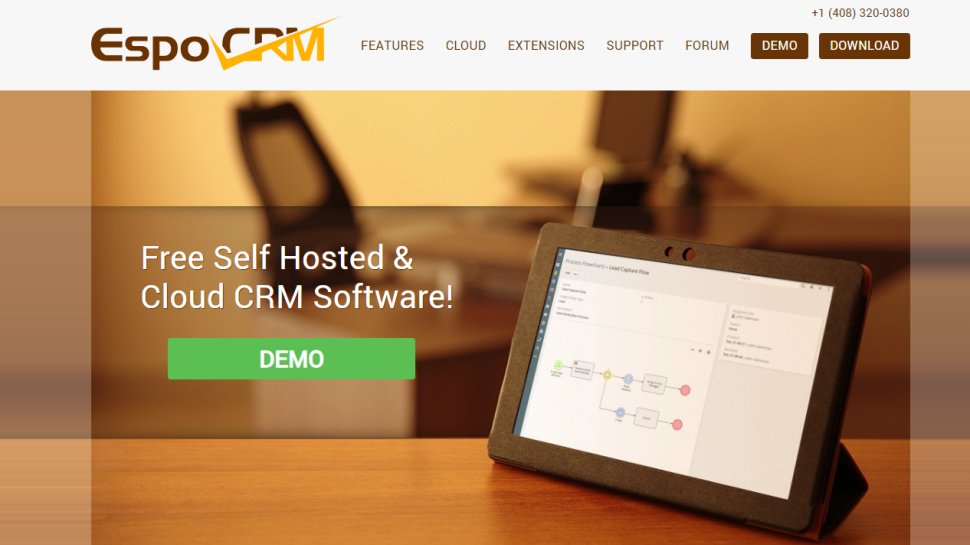
5. EspoCRM
Reasons to buy
Reasons to avoid
There’s no doubt that opting for a self-hosted open source CRM brings with it a number of advantages. There’s much more freedom to be had from this approach - but also a lot more responsibility. Fortunately, EspoCRM offers some extremely helpful documentation, so you won’t feel like you’re on your own if this is the approach you opt for.
This documentation covers everything from sales automation to inventory management. There’s detailed lead tracking functionality on offer, contact management, and a social stream that allows your entire team to follow a particular customer record.
There’s also some robust analytics functionality included with EspoCRM. Users can generate two kinds of reports (List and Grid), with all reports available for display on the dashboard or export to Microsoft Excel.
As well as its detailed documentation, EspoCRM offers excellent paid support but more minor issues can usually be solved via the customer portal free of charge. And, as with other open source CRM tools, the community is also on hand to help.
Honorable mentions
The world of open source continues to grow, so it came as little surprise to us that there were simply too many decent open source CRMs out there - more than we could possibly include in our above list of favorites. It's for that reason that we thought it only fair to point you in the direction of some other leading alternatives below:
Twenty: A lightweight CRM designed specifically for SMEs, Twenty is the brainchild of several individuals who had grown frustrated with traditional offerings. A streamlined interface makes data entry and sales tracking straightforward and frequent updates make it a great choice for businesses that want to scale fast.
Monica: Designed for individuals and small teams, Monica boasts a simple user interface, prioritizing privacy and efficient contact management. Everything is kept in one central hub, making it easy for small businesses to manage, organize and track all their interactions. It might not have enough functionality for larger firms, however.
WuKong CRM: With a host of features to suit enterprises, WuKong CRM has gained a strong reputation as the kind of tool that has all the functionality businesses need. Expect to see customer management, sales pipelines, customer support, and marketing automation features and integration with a number of other solutions.
The best open source CRM comparison table
| Row 0 - Cell 0 | Pricing | Key features |
SuiteCRM | Free (open-source version). Paid, hosted versions are also available with various plans. The text describes it as a "robust, free open source tool." | All the tools needed for sales and marketing, with customization options, a real-time dashboard, and frequent updates. |
Vtiger | Free (open-source version). A paid, subscription-based service is also offered, with plans like "One Growth" for a monthly fee per user. | A vibrant open-source community, email marketing functionality, calendar reminders, automation features, and Gmail integration. |
OroCRM | Free (open-source version). The text mentions a paid option to create a "bespoke white-label CRM." Hosted versions are available with costs based on a quote. | Built on the Symfony2 PHP framework, with code that is easy to understand and change, customer management, reporting, and analytics. |
YetiForce | Free (open-source version). There is an option to pay for additional support and hosting. | Great contact management functionality, real-time data display with widgets, lead tracking, and extensive customization options. |
EspoCRM | Free (self-hosted version). Paid "Cloud" plans are available for a monthly fee per user, which includes hosting and support. | Detailed documentation, robust analytics with reporting, sales automation, inventory management, and a social stream for team collaboration. |
How we tested the best CRM software
When we review CRM software, we look at indicators including feature set, interface and ease of use, plans and pricing, and support options.
A high level of automation capability in managing leads, deals, and workflow is an example feature that could contribute towards a high score. Another important strength would be a desktop and mobile interface allowing quick, intuitive access to basic features.
We look at pricing plans and competitors to check whether higher subscription prices are warranted by features you can’t find elsewhere in the market, or whether a good deal could benefit those with lower budgets.
Generous customer support options are also prioritized, especially for CRM software that may come with a steep learning curve.
Read how we test, rate, and review products on TechRadar.
How to choose the best open source CRM
Ultimately, choosing the best open-source CRM depends on your organization's technical resources and need for data sovereignty - does the desire for total code control and zero licensing fees outweigh the requirement for a dedicated IT team to manage the backend?
For instance, SuiteCRM would be better suited to businesses that need an enterprise-grade platform comparable to Salesforce without the per-user costs. It offers limitless customization and scalability, whereas simpler open-source alternatives like LessAnnoyingCRM (or basic versions of Vtiger) may struggle to handle complex, multi-departmental workflows as your data grows. Those looking for a modern, developer-friendly interface that is easy to deploy via Docker might prefer EspoCRM instead.
Overall, the community health and deployability of the software are vital factors to consider. Because you are responsible for hosting and security, you’ll want a platform with an active developer base and clear documentation so you can hit the ground running - there is no point in choosing a highly flexible CRM if the installation process is too fragmented for your team to maintain.
Best open source CRM FAQs
Which open source CRM is right for you?
First of all, businesses have to decide whether open source tools are right for them. There are undoubted benefits, but it’s understandable if businesses would rather forego the hassle and simply opt for a proprietary solution.
If you have decided that open source is the way to go, some tools are more accessible than others. Do your research and seek out the advice of the open source community. They are a great resource and should help you decide on the right CRM.
Is an open-source CRM truly "free," or are there hidden costs involved?
This is a common misconception. Although open-source CRM software itself often has no licensing fees, there are typically costs associated with implementation, customization, hosting (if self-hosted), ongoing maintenance, and potential professional support or developer fees. So, while an open-source CRM is certainly likely to be free initially, that may not be the case on an ongoing basis.
Will I need more technical expertise in-house if I decide to go with an open-source CRM?
This, of course, depends on the particular open-source CRM and how user-friendly it is. While basic installation might be manageable for teams that have little or no experience using open-source tools or CRMs of any kind, significant customization, integration with other systems, or troubleshooting complex issues often require in-house technical staff or the hiring of developers or consultants. The level of expertise required is likely to differ between end-users and system-level administrators.
What kind of support is available for open-source CRMs, and how does it compare to vendor-provided support?
Understandably, teams considering dipping their toes in the open-source ecosystem are often concerned about getting help when they need it. While it may be true that open-source CRMs do not often have the dedicated support provided by third-party vendors, the open-source community is usually thriving and extremely responsive when help is requested - maybe more so than a third-party vendor.
Online documentation and, potentially, paid support contracts from the software's creators or third-party service providers are other potential avenues for additional support. Of course, there's no getting away from the fact that even the best open-source support is different from the dedicated, often SLA-backed support lines of proprietary CRMs. Open-source support may ask for a little more self-reliance, but that doesn't necessarily mean the support is inferior.
How customizable is an open-source CRM for my specific needs?
This is a major selling point for open-source solutions. There is a high degree of flexibility with open-source CRMs and the ability to tailor the software exactly to unique workflows, forms, reports, and integrations, without being constrained by vendor limitations, is a huge plus. Of course, this customization is likely to require technical expertise.
What are the potential security implications of using an open-source CRM?
Some users may worry that open code means inferior security. Because the CRM's code is open for review (which, admittedly, can lead to quicker identification and patching of vulnerabilities by the community), it also means that malicious actors could potentially find flaws. For users of open-source CRMs, be sure to carry out regular updates, proper configuration, and secure hosting practices to mitigate potential risks. It may require users to adopt a more proactive approach to security, but security audits, encryption, access controls, and other defensive measures can all be employed.
Sign up to the TechRadar Pro newsletter to get all the top news, opinion, features and guidance your business needs to succeed!
Barclay has been writing about technology for a decade, starting out as a freelancer with ITProPortal covering everything from London’s start-up scene to comparisons of the best cloud storage services. After that, he spent some time as the managing editor of an online outlet focusing on cloud computing, furthering his interest in virtualization, Big Data, and the Internet of Things.

